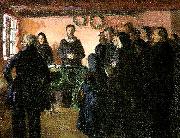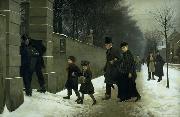Wholesale Oil Painting Reproductions No Minimum and Door to Door! |
|||||||||||
|
|
|||||||||||

|
|||||||||||
|
|
|
||||||||
All Anna Ancher Oil Paintings |
||||||||
|
|
||||||||
|
|
||||||||
|
Artist Introduction: Danish Painter, 1859-1935
was the only one of the Skagen Painters that was actually born in Skagen, Denmark. Anna Ancher was born and grew up in the northernmost area of Jutland, called Skagen (the Skaw). Her talent became obvious at an early age and she grew acquainted with pictorial art via the many artists who settled to paint in Skagen. Anna Ancher studied drawing for 3 years at the Vilhelm Kyhn College of Painting in Copenhagen. However, Anna Ancher developed her own style and was a pioneer in observing the interplay of different colours in natural light. She also studied drawing in Paris at the atelier of Pierre Puvis de Chavannes along with Marie Triepcke, who would marry Peder Severin Krøyer, another Skagen painter. In 1880 she married fellow painter Michael Ancher, whom she met in Skagen. They had one daughter, Helga Ancher. Despite pressure from society that married women should devote themselves to household duties, she continued painting after marriage. Anna Ancher is considered to be one of the great Danish pictorial artists by virtue of her abilities as a character painter and colourist[citation needed]. Anna Ancher's art found its expression in Nordic art's modern breakthrough towards a more truthful depiction of reality, e.g. in Blue Ane (1882) and The Girl in the Kitchen (1883-1886). Anna Ancher preferred to paint interiors and simple themes from the everyday lives of the Skagen people and fishermen, |
||||||||
|
|
||||||||
|
en begravelse Painting ID:: 64628 |
1888
se |
|||||||
Height Width |
INS/CM Quality |
|||||||
|
X |
| |||||||
|
|
||||||||
All Erik Henningsen Oil Paintings |
||||||||
|
|
||||||||
|
|
||||||||
|
Artist Introduction: (29 August 1855 - 28 November 1930) was a Danish painter and illustrator. He is best known for his Social Realist paintings of poor and exposed groups in the 1880s and 1890s. He was the younger brother of Frants Henningsen who was also a painter.
Erik Henningsen was born on 29 August 1855 in Copenhagen to Frants Ludvig Henningsen (1820-1869), a grocer, and Hilda Charlotte Christine ne Schou (1824-1880). He showed an early artistic talent and was articled to decorative painter A. Hellesen. He also took drawing lessons privately with C. V. Nielsen and was admitted to the Royal Danish Academy of Fine Arts in 1873. He graduated in 1877 and won several awards and distinctions, including the Academy's Annual Medal in 1887 and 1890, the Ancher Prize in 1889. |
||||||||
|
|
||||||||
|
|
En Begravelse Painting ID:: 82381 |
oil on canvas, 95 by 141.5 cm. Statens Museum for Kunst.
Date 1883(1883)
cyf |
||||||
Height Width |
INS/CM Quality |
|||||||
|
X |
| |||||||
|
|
||||||||
|
Prev Next
|
||||||||
|
|
||||||||
|
Related Paintings to Erik Henningsen :. |
||||||||
|
|
||||||||
|
CONTACT US |


